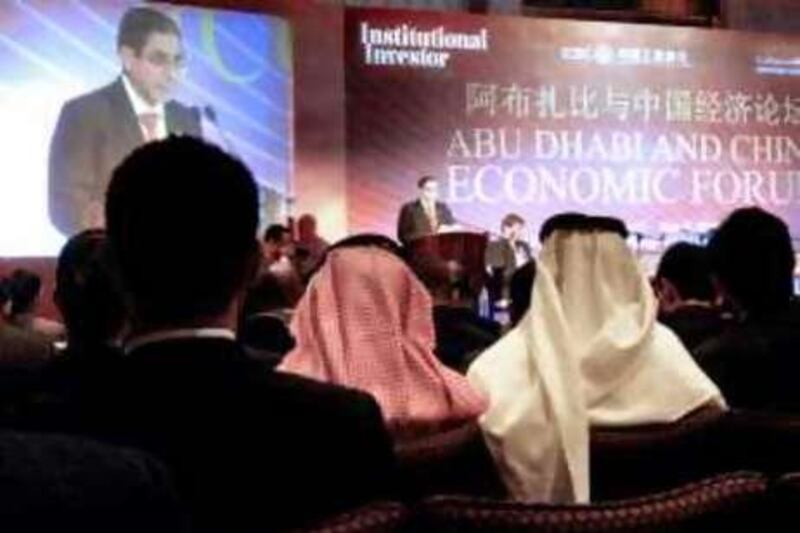SHANGHAI // Economic ties between the UAE and China show huge potential for growth, delegates at the inaugural Abu Dhabi and China Economic Forum have been told amid predictions that bilateral trade could exceed US$100 billion (Dh367.31bn) by 2015.
Abu Dhabi's development of infrastructure and China's rapid economic growth offer potential for a range of activity, from construction companies bidding for contracts to manufacturers looking to capitalise on China's vast manpower, the Shanghai event heard yesterday. Organised by the Abu Dhabi Department of Economic Development, the one-day event brought together groups including bankers, policymakers, renewable energy specialists and heads of investment houses.
The conference heard Arab countries were increasingly looking East when doing business, a phenomenon described by commentators as "New Silk Road" in reference to historical trade routes. "This forum couldn't be more timely," said Nasser Ahmed al Suwaidi, the chairman of the Abu Dhabi Department of Economic Development and the National Bank of Abu Dhabi. "It's a great occasion for investors to learn more about Abu Dhabi, where it stands, where it intends to go and what opportunities it provides."
Trade between the two countries hit $28bn in 2008 before dipping to $21bn last year due to the global slowdown. But Hassan Jarrar, the head of wholesale banking in the UAE for Standard Chartered, predicted it would increase substantially over the coming years and top $100bn by 2015. "The reason we think it's going to be close to $100bn is that [currently] both sides don't know as much as they should about each other and how much opportunities there are," Mr Jarrar said on the sidelines of the forum.
"The Chinese have been very good at entering markets in the Middle East and Africa, mainly in the construction sector, in infrastructure, roads, building and so forth, and in the UAE that's mostly been in Dubai. "In Abu Dhabi that's coming to the surface and that represents opportunities for foreign investment companies in Abu Dhabi and the other way, with Abu Dhabi investing financially in China."
Chinese companies looking to secure contracts in the UAE must, however, differentiate themselves as they face "a lot of competition" from Korean, French and US companies, Mr Jarrar said. He said more UAE investments in manufacturing in China were likely after the recent opening of a plastics factory near Shanghai by Borouge, a joint venture between Abu Dhabi National Oil Company and the Austrian-based plastics company Borealis.
Other participants said strong credit ratings in the GCC made it an attractive destination for Chinese investment, especially given the sovereign wealth crisis in parts of Europe. China and India were becoming the UAE's "important trade partners" for imports and exports, Michael Tomalin, the chief executive of National Bank of Abu Dhabi, said in a keynote speech at the forum. "The growth of the UAE economy and the growth of the Chinese economy are remarkably correlated," Mr Tomalin said.
While saying the UAE and China were "joined at the hip" by energy, he added the UAE was "much more than just an oil story" with an increasingly diversified economy. Abu Dhabi's 2030 plan, Mr Tomalin noted, envisaged the hydrocarbon sector's share of the emirate's economy falling to 40 per cent from 60 per cent. "There are huge opportunities for Chinese construction companies to play a full part in the growth plans for Abu Dhabi over the next 20 years," he said, with sectors such as health care, transport and education set to grow.
In the other direction, the Chinese government's aim to create 9 million new jobs a year, coupled with plans to rapidly develop the country's smaller cities, meant China represented "a golden opportunity" for UAE investors who could expect "a huge return", said Major Gen Omar al Bitar, the UAE ambassador to China. Also in a keynote speech, Yi Huiman, the senior executive vice president of Industrial and Commercial Bank of China (ICBC), said the bank aimed to offer its "railway plus finance" model through collaboration with China's ministry of railways to the planned UAE railway project.
The scheme to link all seven emirates at a cost of between Dh30bn and Dh40bn, will be opened in phases starting in 2013. Richard Bowker, the chief executive of Union Railway, the company behind the project, welcomed ICBC's proposal along with other "creative and innovative" financing schemes. "The Chinese companies we have met have shown tremendous interest," Mr Bowker said. "Chinese companies have a lot of experience of desert railways."
Union Railway plans to seek expressions of interest from companies looking to bid for the project at the start of next month. business@thenational.ae






